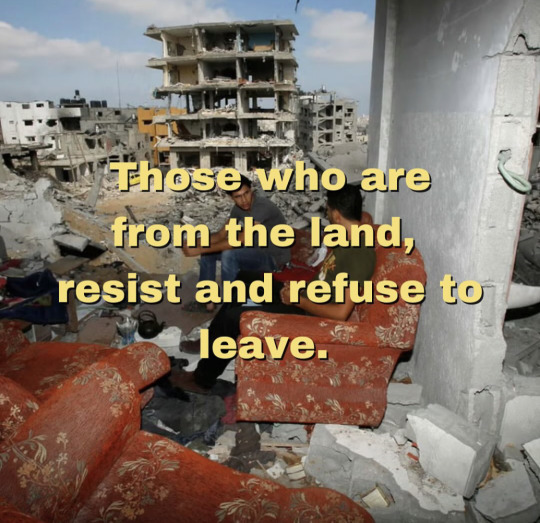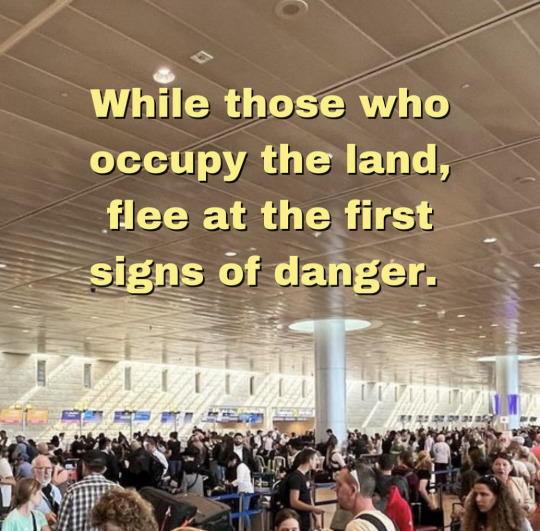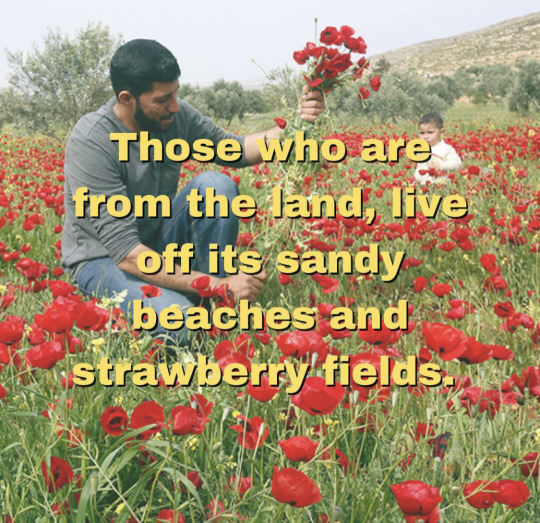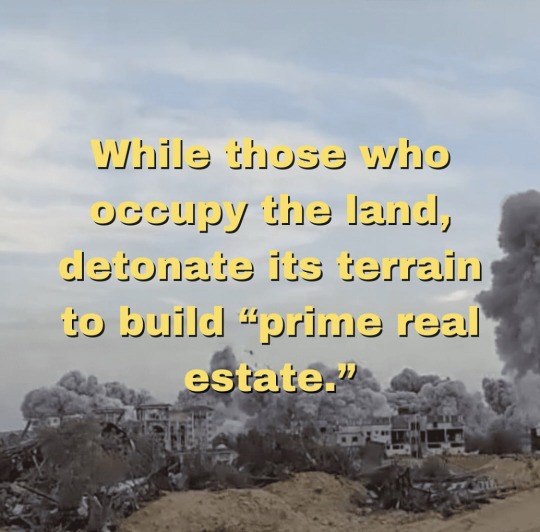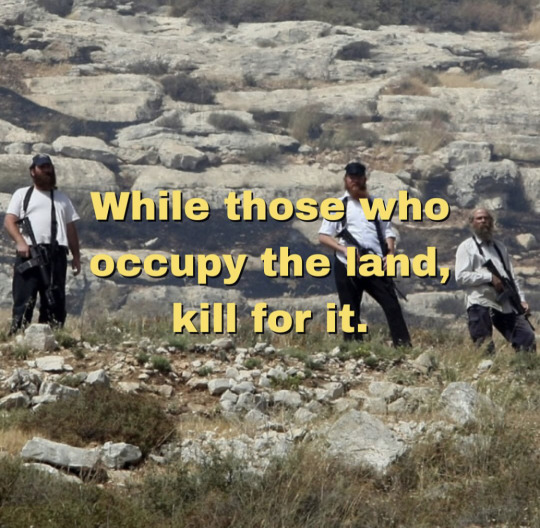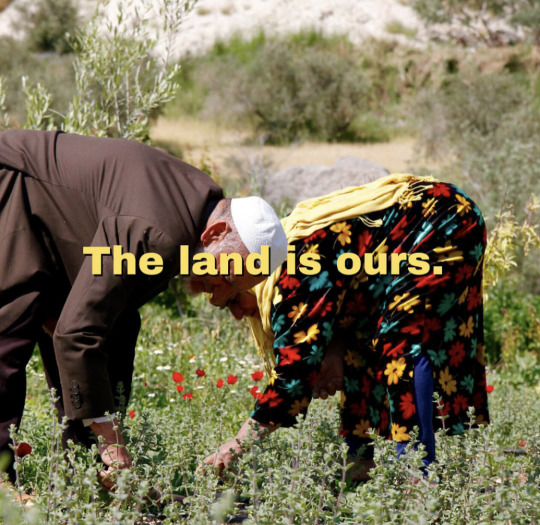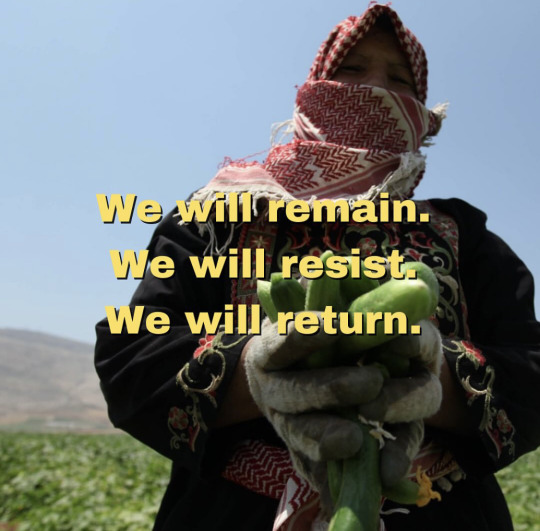Text
Hundreds of people are about to board a flotilla and deliver urgent humanitarian relief to Gaza. Please share this video and follow Gaza Freedom Flotilla. The more people watching, the safer the participants.
2K notes
·
View notes
Text
Jerusalem is concerned that the International Criminal Court in The Hague could soon issue arrest warrants against senior officials, including Israeli Prime Minister Benjamin Netanyahu, over the Israel Defense Forces operation against Hamas, Channel 12 News reported Thursday.
According to the report, an emergency meeting was held at Netanyahu’s office on Tuesday in the presence of Minister of Strategic Affairs Ron Dermer, Justice Minister Yariv Levin and Foreign Minister Israel Katz.
The four decided to take “urgent action with international authorities” to prevent the arrest of Israelis abroad, Channel 12 added.
587 notes
·
View notes
Text
The U.S. will use its veto power against a Palestinian bid to be recognized as a member state of the United Nations during a vote at the Security Council expected to take place Thursday evening.
Vedant Patel, principal deputy spokesperson for the State Department, described as premature an effort by the Palestinian Authority (PA) to gain member status at the U.N.
He said there was not unanimity among the Security Council’s 15 members that the Palestinian Authority had met the criteria for membership, with unresolved questions over the governance of the Gaza Strip, where Israel is in a war to defeat and eliminate the controlling power, Hamas.
“And for that reason, the United States is voting no on this proposed Security Council resolution,” Patel said.
Earlier it was revealed that the United States was secretly pressuring other members of the Security Council to shoot down a Palestinian state membership so the US wouldn't have to use its veto as that would lead to a wave of local and international criticism for Joe Biden.
6K notes
·
View notes
Text
Israeli soldiers are conducting a series of invasive operations across the West Bank, abducting numerous Palestinians, killing and injuring civillians, and engaging in destructive raids on homes and Palestinian property.
This is what happened today (April 18) in the West Bank:
At dawn - Israeli soldiers launched a widespread operation in various parts of the occupied West Bank, breaking into homes, damaging Palestinian properties, and detaining at least 26 Palestinians, including two young women.
At day - The aggression continued as soldiers proceeded to assault Adli Rayyes and his son, Hashem, resulting in various injuries to both of them. Palestinian medics had to transport them to Jericho governmental hospital for treatment.
Afternoon - The Israeli Occupation Forces moved to the central West Bank where they entered the town Deir Ballout (west of Salfit city). There, they confiscated a telecommunications car that was being used for repair and maintenance work.
Evening - Dozens of Israeli soldiers invaded the Ein Al-Sultan refugee camp (north of Jericho). They stormed and ransacked homes within the camp and abducted a young man named Nayef Abu Dahouk, taking him to an unknown destination. At the same time an Israeli military jeep rammed into a young Palestinian woman in Jenin (northern West Bank). She was taken to the Jenin governmental hospital, and is currently suffering from fractures and severe bruising.
The Palestinian Detainees Committee reports that over 40 Palestinians were abducted by Israeli soldiers TODAY alone, from various parts of the West Bank, with a concentration of these abductions occurring in Nablus, followed by operations in Ramallah, Bethlehem, Jericho, Hebron, and Jerusalem.
Two homes belonging to Mohammad and Ahmad Zeidat, who have been kidnapped since January, in the town Bani Naim (near Hebron) were also demolished.
Over 8,310 Palestinians have been abducted by the Israeli Occupation Forces since October 7, 2023.
(Source: IMEMC News, International Middle East Media Center)
3K notes
·
View notes
Photo






Pokemon (Shinsaku Anime) || Amejio “Amethio” Episode 1
379 notes
·
View notes
Text

by MIJISU
art republished with artist’s permission
72 notes
·
View notes
Text
the stuff going on at columbia campus rn is genuinely incredible
#don't forget they did nothing about the fucking weirdo professor who harrasses students#and the chemical attack from former iof against protestors
14K notes
·
View notes
Text


Same Age AU - Shiro and Keith meet older versions of their boyfriends from a different reality! 🥰
Inspired by the wonderful morbidzy 💕
✨Patreon✨
178 notes
·
View notes
Text

"Recommendations for action against Israeli units were sent to Blinken in December, according to one person familiar with the memo. “They’ve been sitting in his briefcase since then,” another official said."
"Even if Blinken were to approve the sanctions, officials said, Israel could blunt their impact. One approach would be for the country to buy American arms with its own funds and give them to the units that had been sanctioned. Officials said the symbolism of calling out Israeli units for misconduct would nonetheless be potent, marking a sign of disapproval of the civilian toll the war is taking."
"[....] Among the allegations reviewed by the committee was the January 2021 arrest of a 15-year old boy by Israeli Border Police. The teen was held for five days at the Al-Mascobiyya detention center on charges that he had thrown stones and Molotov cocktails at security forces. Citing an allegation shared by a Palestinian child welfare nonprofit, forum officials said there was credible information the teen had been forced to confess after he was “subjected to both physical and sexual torture, including rape by an object.”
"Two days after the State Department asked the Israeli government for information about what steps it had taken to hold the perpetrators accountable, Israeli police raided the nonprofit that had originally shared the allegation and later designated it a terrorist organization. The Israelis told State Department officials they had found no evidence of sexual assault or torture but reprimanded one of the teen’s interrogators for kicking a chair."
52 notes
·
View notes
Text

Not just thousands of Palestinian children, but tens of thousands of Palestinian youths, men, women, and the elderly. 5% of Gaza's population has been either severely disabled/injured, has gone missing, or has been genocided. From destroying orchards and farms, to the destruction of Gaza Infrastructure to the point where it has collapsed in many spaces -especially their medical complexes, to the complete lack of access to fresh and clean water. Israhell is also still starving Palestinians -is still committing war crimes, and now this? The zionists are continuing their illegal settler-colonial project full steam ahead apparently, and it's beyond horrific.
790 notes
·
View notes
Text
Is Israeli academia about to enter a whole new phase? All signs are that it already has. In the past few weeks, Haaretz spoke with more than 60 Israeli scholars from a wide range of disciplines and academic institutions, from young scientists and university presidents about their experiences with colleagues abroad since the war broke out in the Gaza Strip after Hamas' massacre on October 7.
They recounted dozens of incidents: cancellation of invitations to conferences, a freeze on their appointments in foreign institutions, rejection of scientific articles on political grounds, disruption of lectures abroad, cessation of collaborative efforts with colleagues abroad, refusal by such colleagues to take part in the promotion process their Israeli counterparts must undergo at local institutions, and even a sweeping boycott of local colleges and universities. The following examples, all from recent months and backed up by documents and emails, are being made public here for the first time. The plethora of events leaves no room for doubt: Israel is feeling the brunt of an unprecedented academic boycott, which is only gathering momentum.
…
It once seemed as if the social sciences and humanities are more vulnerable to political struggles. Indeed, such departments in Israel were familiar with the impact of the boycott, divestment and sanctions movement long before October 7. However, the cessation of collaboration – whether in conducting research, co-authoring articles or in other areas – is now being seen as a widespread phenomenon in all fields.
A few months ago, Nir Davidson, a physics professor at the Weizmann Institute of Science, suggested to an Italian colleague that they try together to request a grant from a competitive research foundation. "Because of the atrocities your country is perpetrating against innocent civilians, thousands of professors and researchers have signed a petition calling for all research collaboration to be blocked," the colleague replied, noting that he "fondly recalls" a visit he made to Israel in 2020, but adding, "I'm afraid that what your country has done and is continuing to do will never be forgotten or forgiven."
About a month ago, a scientist from Ben-Gurion University of the Negev was ejected from an international group that submits research proposals to the European Union in the realm of environmental studies. The explanation he was given by one of his colleagues was, "I'm really sorry, but I'm going to have to not select Israel as a partner for the project. In fact, some partners do not wish to be involved in the project if Israel is a partner, particularly given the current political context. I am truly sorry, and I hope that we will have the opportunity to work together on another research project. Thank you for your understanding and I wish you all the best for the future."
…
"I am writing to let you know that I have decided to step down from the Ph.D. committee [reviewing a student's thesis]," a foreign social sciences scholar wrote the Hebrew University recently. "Following the university's recent declaration of commitment to Zionism in the context of the war that is raging in Gaza, I feel I can no longer be associated with this institution. I have enjoyed working with you all and it is with a heavy heart that I am making this decision."
The "commitment to Zionism" the professor cited was part of the fierce public condemnation the university issued against sharp remarks by Israeli-Palestinian Prof. Shalhoub-Kevorkian, of its law faculty, against Israel's conduct in the war in Gaza. "As a proud Israeli, public, and Zionist institution," the university stated, it condemned her comments and suspended her, before reinstating her two weeks later.
The email from the foreign academic who asked to stop advising the Hebrew University doctoral student is only one example of an apparently growing phenomenon whereby scholars overseas no longer want to help prepare the next generation of lecturers and researchers at Israeli institutions: Sources at a few such institutions admit that they find it increasingly difficult to obtain the letters of evaluation from academics abroad that must be submitted in advance of discussions of staff promotions in Israel.
For the present, it looks as though the latter trend is particularly noticeable in the social sciences and the humanities: in sociology and anthropology, Middle Eastern studies and literature. But according to a source at one university, the field of law is also falling victim to such dwindling collaboration with foreign schools.
…
"If the Israeli government commits irrevocably to either a two-state (within 1967 borders) or one-state solution in which all Palestinians in both Israel and the occupied territories have equal rights to Israelis – I will be happy to engage with Israeli institutions," a senior researcher at a prestigious institution in Europe wrote recently, in response to a request to write an evaluation for an Israeli academic. "Until that day, no." Another European academic wrote: "I do not believe that this suffering of civilians can be justified and I believe that Israel is not acting in accordance with international human rights law. In light of that, I feel I cannot collaborate with any Israeli institution at the moment."
…
"The dam has burst," Drori declares now. "Talking about an academic boycott of scientists in Israel has become legitimate. It's a whole new world. We are in a very extreme situation, and I don't know whether and how it will be possible to reverse things. The boycott is severing our ability to be involved in the forefront of research. All scientific research that does not involve the international community is research that is less good. The severance from the world is suffocating us."
If the pool of international experts who are willing to cooperate with Israel does continue to shrink, Israeli academics will face discouraging alternatives: to approach less senior academics from less well-regarded universities (which, according to a knowledgeable source, is already happening in some cases), or to increase the proportion of assessments provided by local faculty – not a particularly palatable solution.
…
A number of universities and academic organizations in Belgium, Spain, Italy and Norway recently announced full boycotts or a suspension of ties with Israeli institutions until they receive clarifications with regard to topics ranging from the state of academic freedom on their campuses, to their moral, financial and material support for Israel's defense forces. For one, Ghent University recently requested such information from its counterpart in Haifa.
…
"The best-case scenario is that within a short time we will return to some sort of stability," says American studies professor Milette Shamir, vice president of Tel Aviv University and director of its international academic collaborations. "Our standing in the world will be rehabilitated and we will be able to return to the situation we were in, to very extensive international activity."
But Shamir acknowledges that she "doesn't know whether that scenario is realistic." Two weeks ago, she was in Australia to attend an academic fair at the University of Sydney. When she arrived, pro-Palestinian demonstrators shouted that Tel Aviv University shares in crimes against the Palestinians and that all collaborations with Israel should end.
"The worst-case scenario is that we are headed in the direction of South Africa [in the apartheid period]," she says, "with boycotts that keep mounting to the point of paralyzing the system. The result will be a mortal blow to Israeli academia. It will take on a provincial character and we will not be able to integrate into the forefront of the world's research."
— 'I Won't Work With You. You're Committing Genocide': Israeli Academia Faces an Unprecedented Global Boycott. Or Kashti, Haaretz, April 14 2024
5K notes
·
View notes
Text

AHEAD OF THE United Nations Security Council action to consider the Palestinian Authority’s application to become a full member of the international body, the United States is lobbying nations to reject such membership, hoping to avoid an overt “veto” by Washington. The lobbying effort, revealed in copies of unclassified State Department cables obtained by The Intercept, is at odds with the Biden administration’s pledge to fully support a two-state solution.
In 2012, the U.N. General Assembly passed a resolution granting Palestine the status of a non-member observer state.
The diplomatic cables detail pressure being applied to members of the Security Council, including Malta, the rotating president of the council this month. Ecuador in particular is being asked to lobby Malta and other nations, including France, to oppose U.N. recognition. The State Department’s justification is that normalizing relations between Israel and Arab states is the fastest and most effective way to achieve an enduring and productive statehood.
While clarifying that President Joe Biden has worked vigorously to support “Palestinian aspirations for statehood” within the context “of a comprehensive peace that would resolve the Israeli-Palestinian conflict,” a diplomatic cable dated April 12 details U.S. talking points against a U.N. vote for Palestinian statehood. The cable says that Security Council members must be persuaded to reject any proposal for Palestinian statehood — and thereby its recognition as a sovereign nation — before the council’s open debate on the Middle East, scheduled for April 18.
“It remains the U.S. view that the most expeditious path toward a political horizon for the Palestinian people is in the context of a normalization agreement between Israel and its neighbors,” the cable reads. “We believe this approach can tangibly advance Palestinian goals in a meaningful and enduring way.”
“We therefore urge you not to support any potential Security Council resolution recommending the admission of ‘Palestine’ as a U.N. member state, should such a resolution be presented to the Security Council for a decision in the coming days and weeks.”
5K notes
·
View notes
Text
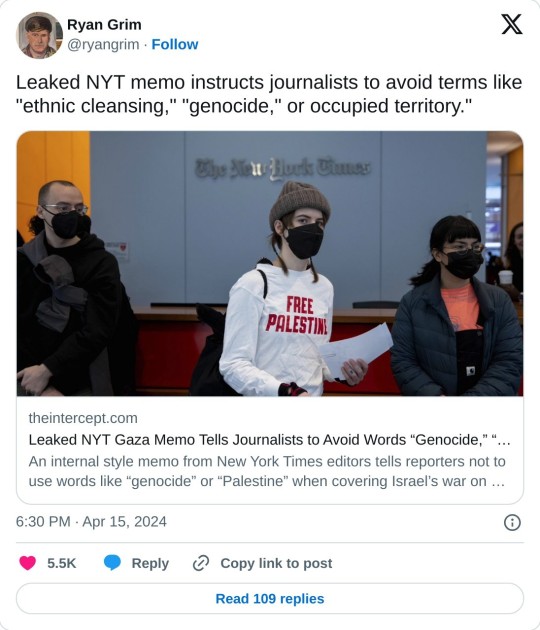
THE NEW YORK TIMES instructed journalists covering Israel’s war on the Gaza Strip to restrict the use of the terms “genocide” and “ethnic cleansing” and to “avoid” using the phrase “occupied territory” when describing Palestinian land, according to a copy of an internal memo obtained by The Intercept.
The memo also instructs reporters not to use the word Palestine “except in very rare cases” and to steer clear of the term “refugee camps” to describe areas of Gaza historically settled by displaced Palestinians expelled from other parts of Palestine during previous Israeli–Arab wars. The areas are recognized by the United Nations as refugee camps and house hundreds of thousands of registered refugees.
The Times memo outlines guidance on a range of phrases and terms. “The nature of the conflict has led to inflammatory language and incendiary accusations on all sides. We should be very cautious about using such language, even in quotations. Our goal is to provide clear, accurate information, and heated language can often obscure rather than clarify the fact,” the memo says.
“Words like ‘slaughter,’ ‘massacre’ and ‘carnage’ often convey more emotion than information. Think hard before using them in our own voice,” according to the memo. “Can we articulate why we are applying those words to one particular situation and not another? As always, we should focus on clarity and precision — describe what happened rather than using a label.”
Despite the memo’s framing as an effort to not employ incendiary language to describe killings “on all sides,” in the Times reporting on the Gaza war, such language has been used repeatedly to describe attacks against Israelis by Palestinians and almost never in the case of Israel’s large-scale killing of Palestinians.
End your New York Times subscription
4K notes
·
View notes
Note
Who are you voting for in the 2024 election?
Biden and I'm happy about it
Biden and I'm NOT happy about it
Trump and I'm happy about it
Trump and I'm NOT happy about it
Third party
Leaving the top of the ticket blank
Not voting at all (for whatever reason)
Not from the US (see results)
88 notes
·
View notes
Text
yall pokemon just dropped the best animated pokemon opening out there
490 notes
·
View notes



